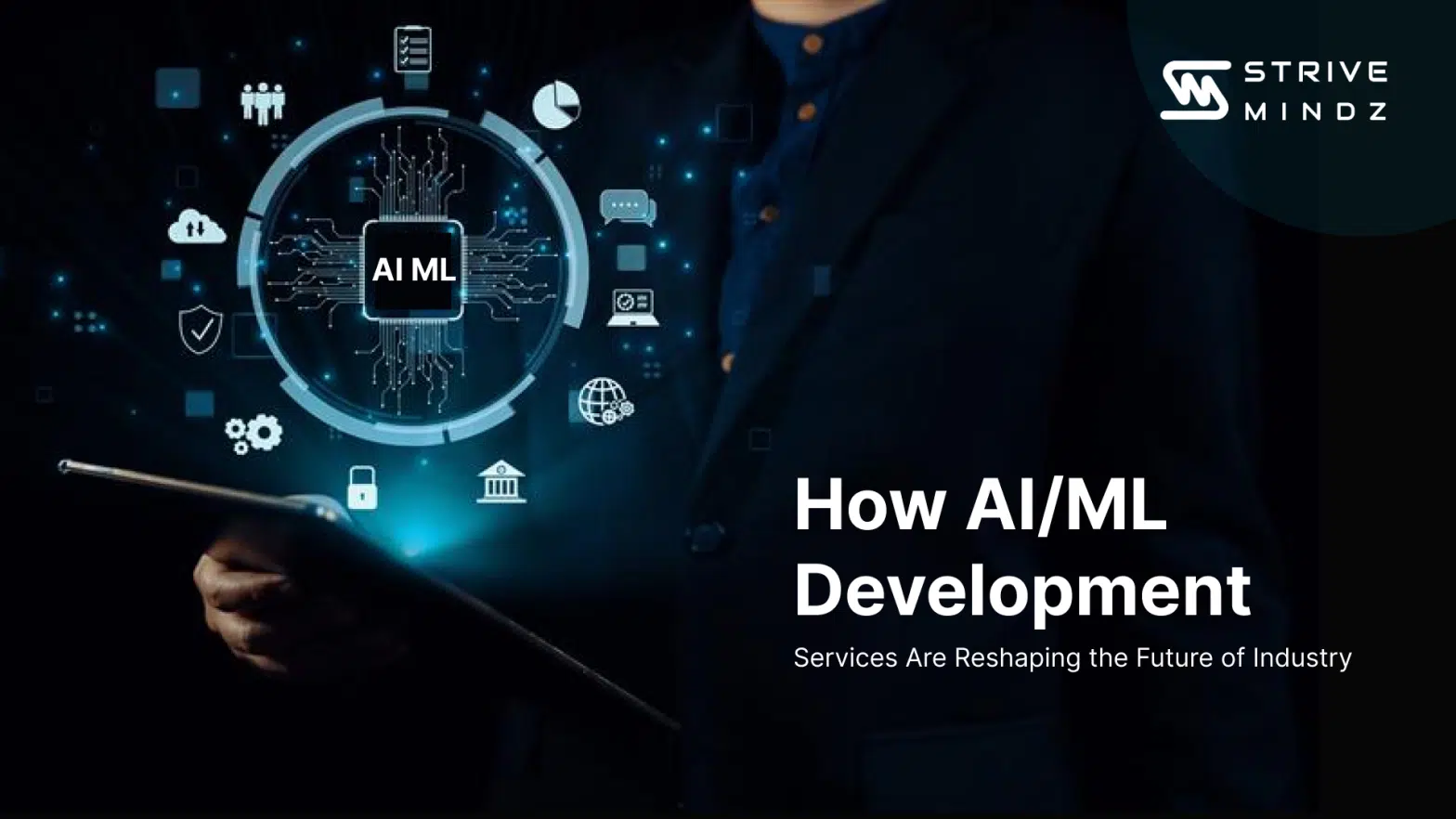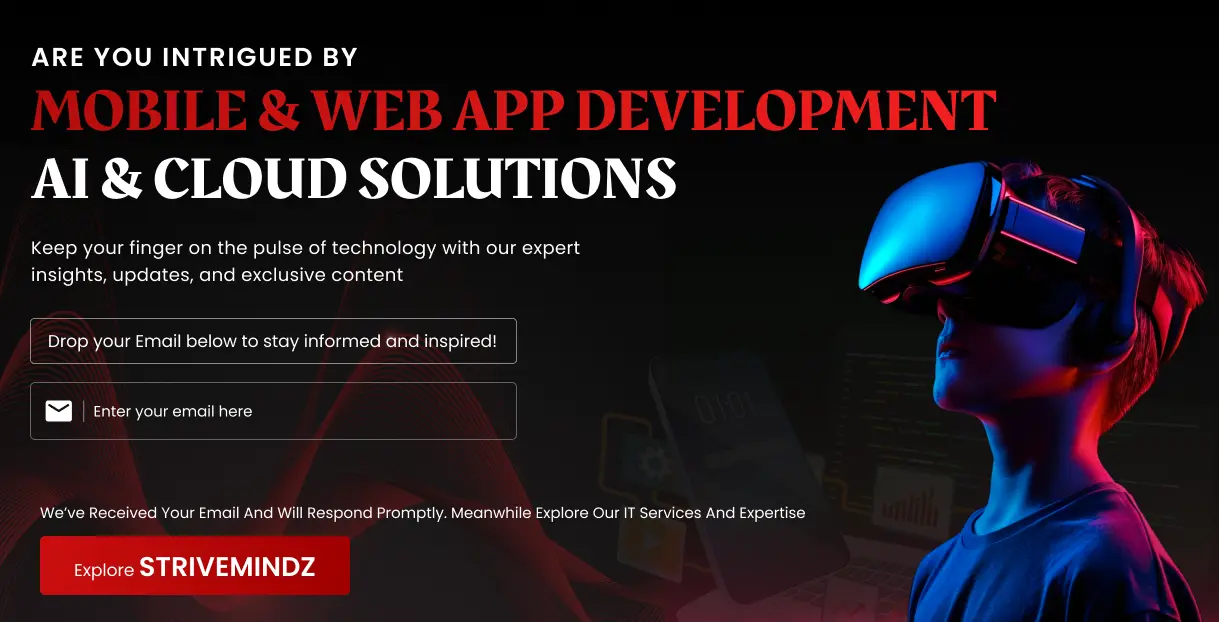How AI/ML Development Services Are Reshaping the Future of Industry

With digital disruption dominating the present age, Machine Learning (ML) and Artificial Intelligence (AI) are no longer buzzwords thrown around casually; they’re harbingers of a next-generation era of disruption. Fortune 500 companies, start-ups, and everything in between are using AI/ML development solutions to automate complex processes, derive greater insights from data, and deliver more tailored experiences. These technologies are disrupting every single element of the industrial setting—accelerating decision-making, boosting operational productivity, and transforming business models themselves.
No matter which industry is producing, banking, healthcare, or commerce, AI and ML have become indispensable means of dealing with competitive market conditions and shifting customer demand at the speed of light.
Table of Contents
AI Development Services: Transforming Industries with Intelligent Solutions
AI development services are aimed at creating, deploying, and maintaining intelligent systems that can simulate human intelligence. AI services are built upon subdomains such as computer vision, natural language processing (NLP), machine reasoning, and robotics to address industry-specific business problems.
A few of the highly requested types of AI-based applications include:
- Predictive Maintenance Systems: AI, in manufacturing, tracks equipment to predict impending breakdowns, reducing downtime and maintenance expenses.
- Fraud Detection Software: Banks use AI to detect suspicious transactions in real time and prevent fraudulent transactions from being executed.
- Intelligent Recommendation Engines: Media companies and consumers leverage AI to personalize product or content recommendations, enhance user experience and conversion.
- Virtual Chatbots and Virtual Assistants: These computer programs offer 24/7 customer support, handle simple queries, and escalate complex cases to human support staff.
Developing AI solutions would typically begin with a strategic advisory process where the client is led by the service provider to set objectives and possibilities for which AI would be able to deliver real value. The development teams subsequently craft customized models, implement them into existing infrastructure, and prepare them for scalability down the line.
Understanding Machine Learning Development: Approaches and Applications
Machine learning operates using three main approaches. In supervised learning, the system is trained using data that already has known outcomes—much like teaching by example. This method is commonly used in applications like email spam filtering, approving loans, or predicting which customers might stop using a service. Unsupervised learning, on the other hand, involves analyzing data without any labels to find hidden patterns or groupings—similar to sorting puzzle pieces without knowing the final image. It’s often used for customer segmentation or identifying shopping trends. Finally, reinforcement learning enables systems to learn through trial and error, refining their performance based on rewards and penalties. This approach is widely used in areas like autonomous vehicles and automated trading.
In industrial and AI-Powered Retail Software Development, machine learning plays a crucial role in optimizing operations. It helps forecast product demand so businesses can manage inventory more effectively, detects unusual behavior or system errors early to prevent disruptions, and supports personalized marketing by analyzing customer behavior to deliver relevant promotions. These machine learning models need to be updated and fine-tuned regularly to remain accurate as data and business conditions evolve.
AI’s Impact on Industries: Shaping the Future of Innovation
The Application of AI in industry cannot be overstated. Mature industries that had been relying on human intervention and traditional systems are adopting AI trends to automate operations, improve safety, and quality.
Key changes in dominant Industries include:
Smarter Manufacturing with Real-Time Monitoring
In manufacturing, AI-powered computer vision systems now detect product defects instantly on production lines, reducing waste and improving quality. Combined with IoT sensors, manufacturers can also predict equipment failures before they happen and gain real-time visibility into their supply chains.
Revolutionizing Healthcare with Intelligent Diagnosis
AI healthcare development solutions are improving how diseases are diagnosed—such as detecting cancer from medical images—and streamlining routine administrative tasks. It’s also helping doctors create personalized treatment plans tailored to each patient’s unique health profile.
Enhancing Finance with Intelligent Automation
The finance sector is undergoing a major transformation. AI not only detects fraud in real time but also powers smart investment platforms. These tools help assess risks more accurately and deliver highly personalized financial services, improving trust and customer satisfaction.
Personalized Retail Experiences at Scale
In retail, AI and machine learning help businesses manage inventory more efficiently, optimize product placement, and personalize shopping experiences—whether in-store or online. This creates a smoother customer journey and better sales outcomes.
Powering Sustainable Energy and Utilities
In the energy and utilities sector, AI is improving how power grids are managed by forecasting consumption and optimizing energy use. This results in reduced operational costs, improved reliability, and lower environmental impact.
The Rise of Smart Industry Environments
With the growth of the Internet of Things (IoT), edge computing, and cloud technologies, AI’s role is expanding even further. These technologies are coming together to create fully connected, smart environments where decisions are made in real time based on data from across operations.
Unlock the Future of Business with AI and Machine Learning
For businesses today, AI and ML aren’t just technical tools—they’re powerful drivers of digital empowerment and transformation. Companies that effectively leverage these technologies gain a significant competitive edge by automating routine processes, reducing human error, and uncovering new revenue opportunities.
The strategic benefits are wide-ranging. AI boosts operational efficiency by automating tasks like data entry, scheduling, and report generation, freeing up employees to focus on more valuable work. It enables real-time decision-making, offering instant insights that help leaders respond quickly and effectively. Through tools like recommendation engines, personalization systems, and chatbots, businesses can enhance the customer experience, increasing engagement and satisfaction.
AI also fuels new business models, allowing companies to shift from traditional product sales to predictive, subscription-based offerings. Furthermore, predictive analytics play a crucial role in identifying risks early—whether in supply chains, cybersecurity, or financial operations—helping businesses stay ahead of potential issues. Organizations that align AI initiatives with strategic goals and invest in change management tend to see stronger results and higher adoption across teams.
Building Custom AI and ML Models for Business Transformation
While many custom AI solutions exist today, custom AI and ML development allows organizations to create solutions tailored to their unique business operations and strategic goals.
Business and operations organisations need one-time developments:
Speed of adaptation: Custom-built models are designed from scratch, making them easier to adapt to specific business environments without excessive reconfiguration.
Accuracy: Proprietarized solutions are more accurate than generic solutions.
Roll into existing systems: AI solutions can roll into existing systems such as ERPs, CRMs, and IoT sensors.
Intellectual property and control: Intellectual property and confidential information belong to companies.
Example applications:
- A city employing a customized traffic forecast model for city mobility.
- An insurance company developing AI to identify claim fraud from past data.
- A media firm developing a content moderation system through best practices learned from its own community guidelines.
- Custom solutions are more time-intensive to develop but provide long-term value and strategic differentiation.
AI’s Role in Transforming Traditional Business Operations
Artificial Intelligence (AI) is reshaping traditional businesses by automating routine tasks, improving efficiency, and reducing costs. It enhances customer experience through personalized services and supports data-driven decision-making. AI also optimizes operations like supply chains and logistics. While boosting productivity, it is also changing job roles, increasing demand for tech skills and reducing reliance on manual labor.
Automation of Repetitive Tasks:
AI automates routine tasks such as data entry, inventory management, and customer support, improving efficiency and reducing labor costs.
Enhanced Customer Experience:
AI-driven chatbots, recommendation engines, and personalized marketing help businesses provide faster, more tailored service to customers.
Data-Driven Decision Making:
AI analyzes large volumes of data to uncover trends and insights, enabling smarter business decisions and more accurate forecasting.
Operational Efficiency:
AI optimizes supply chains, manages logistics, and improves resource allocation, resulting in cost savings and improved productivity.
Disruption of Traditional Roles:
AI reshapes job roles, often reducing the need for manual labor while increasing demand for tech-savvy and analytical positions.
How to Choose the Right AI/ML Development Partner for Your Business
Choosing the Right AI/ML Development Partner:
Selecting the right AI/ML development company is crucial to the success of your AI project. You need a partner who not only has technical expertise but also understands your business needs.
What to Look for in an AI/ML Development Partner
Industry and Technical Expertise:
Choose a partner with experience in your specific industry and strong technical skills. For example, Zebra Medical Vision in healthcare has successfully used AI for medical imaging, while DeepMind has pioneered AI in patient care predictions.
Collaborative and Business-Focused Approach:
Your partner should work closely with your team to align AI solutions with your business goals. Salesforce excels in retail by offering AI-powered personalization through its Einstein AI platform, while Cognizant helps integrate AI across multiple industries like retail and finance.
Commitment to Security and Ethics:
Look for a partner who prioritizes data security and ethical AI practices. IBM Watson is known for ensuring compliance with financial regulations, and Palantir emphasizes transparency and secure data management in sectors like government and finance.
How can small and medium businesses benefit from AI/ML development?
Small and medium-sized businesses can leverage AI/ML to automate customer service, personalize user experiences, optimize pricing and inventory, and analyze customer behavior. With cloud deployment, these technologies can be implemented quickly and cost-effectively, often with minimal upfront investment.
What is the lead time to build a custom AI/ML solution?
The timeline depends on the complexity of the solution. Simple chatbot or basic recommendation system would be 4–6 weeks. Deep learning solutions, big data, or integration with other systems would take months. Agile allows quicker realization of value since delivery is iterative.
Is AI development expensive?
Although enterprise customization is costly, open-source platform software, pre-trained models, and cloud computing have contained costs. Elastic price models, where scaling up and down as well as are offered by most vendors, are offered by most vendors.
Which industries are AI/ML driving adoption?
Flagship sectors are finance, technology, retail, and healthcare. Construction, legal, logistics, and education sectors also increasingly use AI to extend farther and operate more effectively.
How safe is AI when working with sensitive data?
AI can be highly secure when designed and implemented with strong data governance and cybersecurity practices. Handling of sensitive information, such as personal, financial, or medical data, requires strict compliance with industry regulations, particularly in sectors like healthcare, finance, and law.

Keep up the great work! Thank you so much for sharing a great posts.